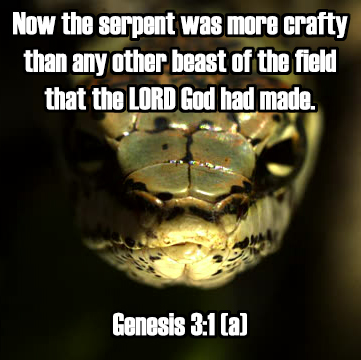
1 Now the serpent was more crafty than any other beast of the field that the LORD God had made.
He said to the woman, “Did God actually say, ‘You shall not eat of any tree in the garden’?”
This is of course the passage of scripture where God’s “very good” creation, paradise on earth is put in jeopardy. The passage starts with the introduction of the serpent, although the original text simply uses the word serpent, later texts and traditions identify this serpent as Satan.
There are a few noteworthy aspects about the serpent:
First, the serpent is described as crafty, again the Hebrew word used for crafty is similar to the word for nakedness used only one verse earlier in chapter 2, and suggests that this creature will change mankind’s perception of nakedness from one of innocence to one of shame.
Second, the serpent speaks. It talks. It holds a conversation, with Eve, and she with it. This could suggest a couple of things: Perhaps certain animals were able to speak before the fall, however it seems more likely that this had something to do with the nature of the serpent.
The Hebrew word for serpent, “nachash,” is similar in sound and spelling to bronze, “nechash.” This may allow for the word serpent to be interpreted as a divine or spiritual being with a brazen or even glowing appearance, possibly in the form of a snake – making the jump to the conclusion that this serpent was Satan much more reasonable.
When the serpent speaks, he questions God’s words, and in effect, God’s goodness. He addresses Eve, and not Adam, trying to upset the natural order. He wants the helper to take the lead.
2 And the woman said to the serpent, “We may eat of the fruit of the trees in the garden, 3 but God said, ‘You shall not eat of the fruit of the tree that is in the midst of the garden, neither shall you touch it, lest you die.’ ”
Eve gives the serpent a proper response, apparently unsurprised that it is speaking to her. She quotes God’s words, the very words the serpent was questioning. However, she adds to God’s restriction by saying “neither shall you touch it.” While this could have been part of God’s command that was simply omitted, it seems more likely that this was something Adam and Eve decided on. If they did not touch the fruit, they could not eat it.
4 But the serpent said to the woman, “You will not surely die. 5 For God knows that when you eat of it your eyes will be opened, and you will be like God, knowing good and evil.”
The serpent now directly challenges God, suggesting that God is holding Adam and Eve back, that if they would eat the fruit they would have knowledge like God. He tempts Adam and Eve with what they already have. They are already made in God’s image, they are already “like God.” Strangely enough this temptation is not an outright lie – Adam and Eve will not die right away physically, and they do receive the ability to determine good and evil, but it is not all that the serpent makes it out to be.
6 So when the woman saw that the tree was good for food, and that it was a delight to the eyes, and that the tree was to be desired to make one wise, she took of its fruit and ate, and she also gave some to her husband who was with her, and he ate.
Eve listens to the snake, directly rebelling against God. She also gives the fruit to Adam, “who was with her.” Adam was right there watching the entire scene. In this moment he fails to take the leadership and responsibility as the man, and allows the serpent, and then Eve to rule over him. Perhaps he was hesitant to believe the serpent, but when Eve didn’t die immediately after eating the fruit, as he supposed she would, he took some as well, failing as a man and rebelling against God.
7 Then the eyes of both were opened, and they knew that they were naked. And they sewed fig leaves together and made themselves loincloths.
Because of their actions, Adam and Eve are no longer innocent but ashamed in their nakedness, they can no longer be completely comfortable in each other’s presence without covering up. They make garments out of fig leaves, which would irritate the skin, a reminder of the discomfort they already feel.
8 And they heard the sound of the LORD God walking in the garden in the cool of the day, and the man and his wife hid themselves from the presence of the LORD God among the trees of the garden. 9 But the LORD God called to the man and said to him, “Where are you?” 10 And he said, “I heard the sound of you in the garden, and I was afraid, because I was naked, and I hid myself.” 11 He said, “Who told you that you were naked? Have you eaten of the tree of which I commanded you not to eat?”
Adam and eve are not only ashamed in each others presence, but also in the presence of God. Before now Adam and Eve would walk with God in the garden, now they hide from Him. When God calls out to Adam, Adam admits that he is ashamed. God immediately links the feeling of shame to the sin Adam and Eve committed. Here God asks them questions, not because He doesn’t know the answer, but to give Adam and Eve a chance to be honest and admit what they have done.
12 The man said, “The woman whom you gave to be with me, she gave me fruit of the tree, and I ate.”
Adam, instead of admitting his own failures, he points his finger at his wife. He again fails to take responsibility.
13 Then the LORD God said to the woman, “What is this that you have done?” The woman said, “The serpent deceived me, and I ate.”
Eve likewise, when given the chance to confess, points the blame away from herself.
14 The LORD God said to the serpent,
“Because you have done this,
cursed are you above all livestock
and above all beasts of the field;
on your belly you shall go,
and dust you shall eat
all the days of your life.
God does not give the serpent a chance to confess, but skips straight to the punishment. This suggests that mankind had a special opportunity as the image bearers of God. The legs of the serpent are taken away, and it is forced to slither on it’s belly.
15 I will put enmity between you and the woman,
and between your offspring and her offspring;
he shall bruise your head,
and you shall bruise his heel.”
This verse is the first depiction of a messianic prophecy. From now on Scripture is going to be looking for a son of the woman, one who will crush the serpents head.
16 To the woman he said,
“I will surely multiply your pain in childbearing;
in pain you shall bring forth children.
Your desire shall be contrary to your husband,
but he shall rule over you.”
Eve’s punishment is twofold, pain in childbirth, one of these most painful experiences a human can go through, and being unwillingly subject to her husband. Perhaps it is a promise of problems even in marriage, where the two rather than being one as God intended, they will instead be fighting for control in their leadership. It also promises man’s domination over woman, possibly the result of men on average, being naturally stronger than women. While the husband being the dominating figure of the family is part of God’s curse, it is by no means how He originally intended marriage to be.
17 And to Adam he said,
“Because you have listened to the voice of your wife
and have eaten of the tree
of which I commanded you,
‘You shall not eat of it,’
cursed is the ground because of you;
in pain you shall eat of it all the days of your life;
18 thorns and thistles it shall bring forth for you;
and you shall eat the plants of the field.
19 By the sweat of your face
you shall eat bread,
till you return to the ground,
for out of it you were taken;
for you are dust,
and to dust you shall return.”
Adam is not cursed, but rather the rest of creation is cursed in his place. His punishment is that the earth will no longer freely offer him food, rather he is going to have to work hard to bring a harvest, which will be complicated by thorns and thistles. Work will no longer be an easy and fulfilling process, but rather a laborious process that will last until Adam expires and returns to the earth.
20 The man called his wife’s name Eve, because she was the mother of all living. 21 And the LORD God made for Adam and for his wife garments of skins and clothed them.
Adam finally gives Eve a proper name, one that signifies her role in all creation, as a mother. God is merciful and graceful even in their punishment, he does not outright kill Adam and Eve, although they deserve it. Instead He provides garments for them to replace their fig leaf coverings, removing the irritating coverings and giving them comfortable and warm clothing. These likely came from the first animals Adam and Eve had to sacrifice, and God taught them how to sacrifice animals for their sins.
22 Then the LORD God said, “Behold, the man has become like one of us in knowing good and evil. Now, lest he reach out his hand and take also of the tree of life and eat, and live forever—” 23 therefore the LORD God sent him out from the garden of Eden to work the ground from which he was taken. 24 He drove out the man, and at the east of the garden of Eden he placed the cherubim and a flaming sword that turned every way to guard the way to the tree of life.
Interestingly enough God admits that part of the serpents argument was true, the fruit did make Adam and Eve “like God” in that they now understood good and evil. God sends them out of the garden to protect them from eating from the tree of life. Living forever won’t remove the consequences of their sin, but rather ensure that they can never be redeemed. So rather than allow them to physically live forever while spiritually dead, God allows them to die physically so that they may be saved spiritually, and eventually rectify the problem entirely. Unfortunately this means removing them from the garden, and keeping them from returning. So mankind was removed from the presence of God.
